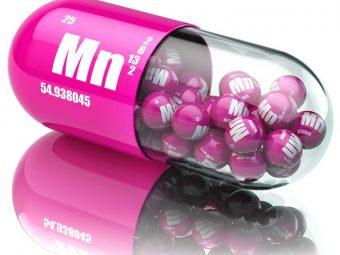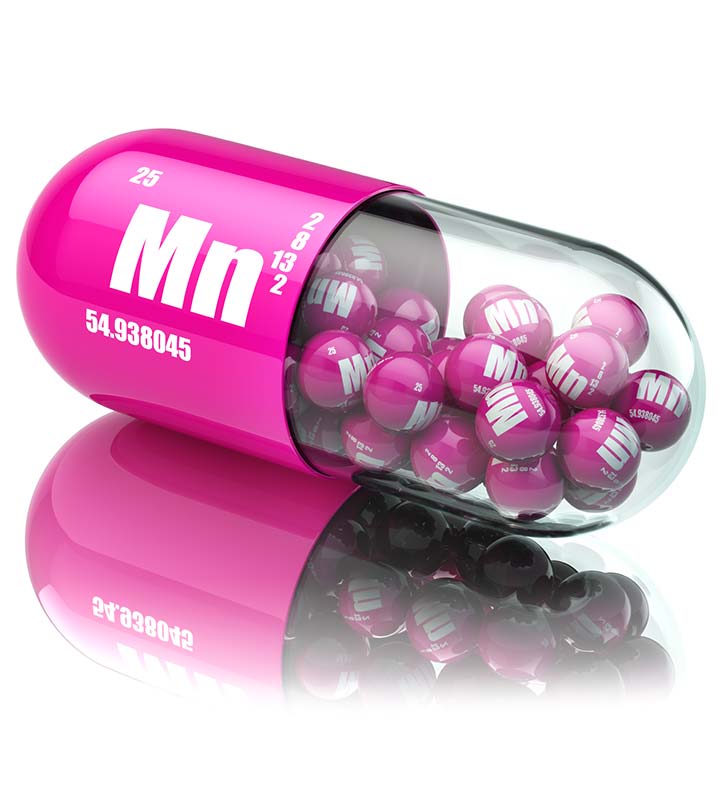Manganese has numerous health benefits, including its role in bone formation and blood clotting, reducing inflammation, treating inflammatory disorders, regulating blood sugar, and decreasing the risk of health conditions like stroke. However, excessive intake of manganese can lead to serious side effects, such as poor bone health and symptoms similar to Parkinson’s disease.
Pregnant or breastfeeding women, as well as those with liver disease, should avoid taking manganese supplements due to potential risks. The best forms of manganese are manganese gluconate and manganese citrate, which are highly absorbable and provide optimal bioavailability.
Manganese deficiency can cause joint pains, fertility problems, poor bone health, etc.

Introduction To Manganese
Manganese offers 12 practical benefits, including brain health, regulating sugar levels, treating inflammation, and protecting against oxidative damage. However, excessive intake can cause poor bone health and symptoms similar to Parkinson’s disease. Choosing the correct form, such as manganese gluconate or citrate, is essential for optimal bioavailability.
What is Manganese?
Health Benefits Of Manganese
Manganese is an essential mineral that offers numerous health benefits. From promoting bone health to protecting against oxidative damage, its role in the body is crucial. Here are some of the ways that manganese can positively impact your health:
Promotes Bone Health
Manganese plays a vital role in the formation and maintenance of healthy bones. It produces collagen, a protein essential for bone strength and structure. By ensuring an adequate intake of manganese, you can support the growth and development of strong, healthy bones.
It helps regulate blood sugar.
Manganese is involved in the metabolism of carbohydrates, specifically in the production of insulin and the utilization of glucose. This mineral helps regulate blood sugar levels, preventing spikes and crashes that can lead to insulin resistance and diabetes. You can promote stable blood sugar levels and support overall metabolic health by including manganese-rich foods in your diet.
Reduces Inflammation
Manganese possesses anti-inflammatory properties that can help reduce inflammation in the body. Regular consumption of manganese-rich foods or supplements can help alleviate symptoms of inflammation, such as joint pain and swelling. By reducing inflammation, manganese can improve overall joint health and mobility.
Supports Brain Health
Manganese plays a crucial role in supporting brain health and function. It produces neurotransmitters, which are essential for proper cognitive function. Adequate manganese intake can enhance memory, focus, and overall brain performance. Incorporating manganese-rich foods into your diet can promote optimal brain health and cognitive function.
Protects Against Oxidative Damage
Manganese acts as an antioxidant in the body, which means it helps protect against oxidative damage caused by free radicals. By neutralizing these harmful molecules, manganese helps prevent cellular damage and supports overall health. Including manganese-rich foods can boost your antioxidant defense system and protect your cells from damage.
Alleviates Pms Syndrome
Manganese has been shown to alleviate symptoms of premenstrual syndrome (PMS). Its role in regulating hormone balance helps reduce mood swings, irritability, and other emotional symptoms associated with PMS. Ensuring sufficient manganese intake, women can experience relief from PMS symptoms and improve their overall well-being.
Manganese offers a range of health benefits, from promoting bone health to supporting brain function and reducing inflammation. You can optimize your overall health and well-being by incorporating manganese-rich foods into your diet or considering manganese supplements.
Side Effects And Precautions Of Manganese
Manganese can have adverse effects on the body, such as causing a neurological condition called manganism, similar to Parkinson’s disease. Pregnant or breastfeeding individuals should avoid inhaling manganese, and those with liver disease should be cautious of excessive manganese intake.
However, taking the correct manganese gluconate or citrate can provide health benefits like treating inflammation and regulating blood sugar levels.
Adverse Effects Of Manganese On The Body
Excessive exposure to manganese dust or fumes can negatively affect the body. This can lead to a neurological condition called manganism, which exhibits symptoms similar to Parkinson’s disease. Some common symptoms of manganism include trembling, stiffness, slow motor movement, and potentially severe depression, anxiety, and hostility. It is important to limit exposure to manganese to prevent these negative effects from occurring.
Who Should Not Take Manganese Supplements?
Manganese supplements are generally safe for most individuals when taken at appropriate dosages. However, certain groups of people should avoid taking manganese supplements. Pregnant or breastfeeding women should avoid inhaling manganese, as it can be unsafe for them and their babies. Additionally, individuals with long-term liver disease may have difficulty getting rid of manganese from their system, which can lead to an accumulation of manganese and subsequent side effects. If you have liver disease, it is essential to be cautious and avoid excessive manganese intake.
Best Form Of Manganese To Take
When choosing a manganese supplement, the best forms to take are manganese gluconate or manganese citrate. These forms of manganese have high absorption rates and offer optimal bioavailability to the body. By opting for these forms of manganese, you can ensure that your body can absorb and utilize the nutrient effectively.
Symptoms Of Manganese Deficiency
Manganese deficiency can lead to a variety of symptoms and health issues. Some common symptoms of manganese deficiency include joint pain, fertility problems, and poor bone health. Manganese is essential for brain health and helps regulate sugar levels, metabolism rate, and inflammation. It also protects the body against oxidative damage and can alleviate symptoms associated with premenstrual syndrome (PMS).
Excess Manganese And Its Side Effects
While manganese is an essential mineral for the body, excessive levels can lead to serious side effects. These side effects include poor bone health and symptoms similar to Parkinson’s disease, such as tremors. It is essential to maintain a balanced intake of manganese and avoid excessive supplementation to prevent these side effects from occurring. Regular monitoring of manganese levels can help ensure that you maintain a healthy body balance.
Dangers And Risks Of Manganese
Excessive exposure to manganese, whether through inhalation or supplementation, can pose certain dangers and risks to your health. It is crucial to be aware of these risks and take necessary precautions. If you experience any symptoms of manganism or other adverse effects of manganese, it is essential to seek medical attention and consider reducing your manganese exposure. By being mindful of the potential dangers and risks, you can ensure that you are promoting your overall well-being and health.


Frequently Asked Questions On 12 Effective Health Benefits Of Manganese & Its Side Effects
What Are The Negative Effects Of Manganese On The Body?
Exposure to manganese dust or fumes can cause manganism, a neurological condition with symptoms like Parkinson’s disease. These symptoms include trembling, stiffness, slow movement, severe depression, anxiety, and hostility. Manganese is also unsafe when inhaled during pregnancy or breastfeeding, and excessive amounts can lead to poor bone health and symptoms similar to Parkinson’s disease.
Who Should Not Take Manganese Supplements?
Pregnant or breastfeeding women should not take manganese supplements, as inhaling manganese can be unsafe for both the mother and the baby. People with liver disease should also avoid manganese supplements, as they can build up in the body and cause side effects.
What Is The Best Form Of Manganese To Take?
The best form of manganese to take is manganese gluconate or manganese citrate. These forms are highly absorbable and provide optimal bioavailability.
What Are Symptoms Of Manganese Deficiency?
Symptoms of manganese deficiency include joint pains, fertility problems, poor bone health, and brain-related issues. Manganese is also essential for regulating sugar levels, metabolism, and inflammation, protecting against oxidative damage, and alleviating PMS syndrome.
Conclusion
To sum up, manganese offers several health benefits, such as supporting brain health, regulating sugar levels, treating inflammation, protecting against oxidative damage, and alleviating PMS symptoms. However, it’s essential to be aware of the potential side effects of excess manganese, such as poor bone health and symptoms similar to Parkinson’s disease.
It’s recommended to consult with your healthcare provider before taking manganese supplements to ensure proper dosage and avoid any potential risks.


